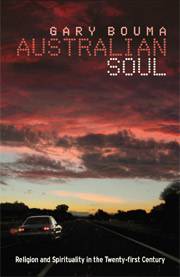Book contents
- Frontmatter
- Contents
- Tables and Figures
- Preface
- Acknowledgements
- 1 Introduction
- 2 Qualities of Australian religion and spirituality
- 3 Quantities of Australian religion and spirituality
- 4 Spirituality and cultural change
- 5 The changing social location of religion and spirituality
- 6 The mainstream: From Christendom to comfortable on the margins
- 7 Religion and spirituality respond to change
- 8 Religion, spirituality and Australian social policy
- 9 Signs of hope in the twenty-first century
- Further reading
- References
- Index
7 - Religion and spirituality respond to change
Published online by Cambridge University Press: 05 June 2012
- Frontmatter
- Contents
- Tables and Figures
- Preface
- Acknowledgements
- 1 Introduction
- 2 Qualities of Australian religion and spirituality
- 3 Quantities of Australian religion and spirituality
- 4 Spirituality and cultural change
- 5 The changing social location of religion and spirituality
- 6 The mainstream: From Christendom to comfortable on the margins
- 7 Religion and spirituality respond to change
- 8 Religion, spirituality and Australian social policy
- 9 Signs of hope in the twenty-first century
- Further reading
- References
- Index
Summary
Religion and spirituality are not passive recipients of the effects of social and cultural change. Marginalisation is not the only story. Understanding the role of religion and spirituality in the twenty-first century requires an appreciation of the new vitality of religion that has become increasingly apparent since the mid-1980s. The events of September 11, 2001 brought to the attention of the world the power and vitality of religion. Whatever other causes and meanings may be ascribed to them, these attacks were religiously motivated and aimed to transform the world. At the same time religiously grounded responses to these and other attacks were formed in the USA as the Christian neoconservatives with power bases in mega-churches began to use their influence to shape domestic and foreign policy. The Bali bombings, attacks on consulates and participation with the USA in the War on Terror have brought these issues home to Australia.
This chapter describes ways in which religion and spirituality are active participants that respond to social and cultural change, at times fully cooperating, at others instigating and at still others resisting change. Some of these responses to change reflect deliberate choices, and others emerge from the complex interactions between religious and spiritual life and their social and cultural environments.
These more proactive religious and spiritual responses to change can be examined under three basic processes: religious revitalisation, fundamentalisation and innovation, including changes in theology. While the mainstream churches were being sidelined, other processes were at work.
- Type
- Chapter
- Information
- Australian SoulReligion and Spirituality in the 21st Century, pp. 143 - 171Publisher: Cambridge University PressPrint publication year: 2006



